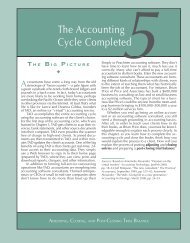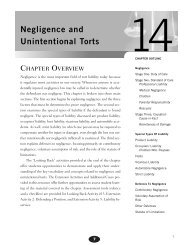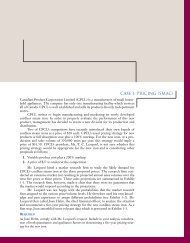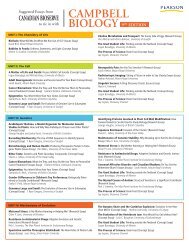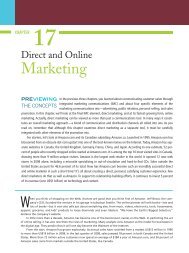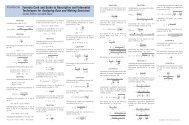Groups and Teamwork - Pearson Canada
Groups and Teamwork - Pearson Canada
Groups and Teamwork - Pearson Canada
Create successful ePaper yourself
Turn your PDF publications into a flip-book with our unique Google optimized e-Paper software.
Chapter 5 <strong>Groups</strong> <strong>and</strong> <strong>Teamwork</strong> 189<br />
in rudeness <strong>and</strong> disregard toward others by bosses <strong>and</strong> co-workers in recent years. Nearly<br />
half of employees who have suffered this incivility report that it has led them to think<br />
about changing jobs, with 12 percent actually quitting because of it. 41<br />
As with norms in general, individual employees’ antisocial actions are shaped by<br />
the group context within which they work. Evidence demonstrates that the antisocial<br />
behaviour exhibited by a work group is a significant predictor of an individual’s antisocial<br />
behaviour at work. 42 In other words, deviant workplace behaviour is likely to flourish<br />
where it’s supported by group norms. What this means for managers is that when<br />
deviant workplace norms surface, employee cooperation, commitment, <strong>and</strong> motivation<br />
are likely to suffer. This, in turn, can lead to reduced employee productivity <strong>and</strong> job<br />
satisfaction, <strong>and</strong> increased turnover.<br />
Status<br />
Status is a socially defined position or rank given to groups or group members by others.<br />
It permeates all of society. We live in a class-structured society. Despite all attempts<br />
to make it more egalitarian, we have made little progress toward a classless society. Even<br />
the smallest group will develop roles, rights, <strong>and</strong> rituals to differentiate its members.<br />
Status is an important factor in underst<strong>and</strong>ing human behaviour because it is a significant<br />
motivator. Status has major behavioural consequences when individuals perceive<br />
a disparity between what they believe their status to be <strong>and</strong> what others perceive it to be.<br />
status<br />
A socially defined position or rank<br />
given to groups or group members<br />
by others.<br />
Status <strong>and</strong> Norms<br />
Status has been shown to have some interesting effects on the power of norms <strong>and</strong><br />
pressures to conform. For instance, high-status members of groups <strong>and</strong> teams are often<br />
given more freedom to deviate from norms than are other group members. 43 Highstatus<br />
people are also better able to resist conformity pressures than their lower-status<br />
peers. An individual who is highly valued by a group, but who doesn’t much need or care<br />
about the social rewards the group provides, is particularly able to pay minimal attention<br />
to conformity norms. 44<br />
These findings explain why many star athletes, famous actors, top-performing salespeople,<br />
<strong>and</strong> outst<strong>and</strong>ing academics seem oblivious to appearance or social norms that<br />
constrain their peers. As high-status individuals, they’re given a wider range of discretion.<br />
But this is true only as long as the high-status person’s activities aren’t severely detrimental<br />
to group goal achievement. 45<br />
Status Equity<br />
It is important for group members to believe that the status hierarchy is equitable.<br />
When inequity is perceived, it creates disequilibrium that results in various types of<br />
corrective behaviour. 46<br />
The concept of equity presented in Chapter 4 applies to status. People expect rewards<br />
to be proportionate to costs incurred. If Isaac <strong>and</strong> Anne are the two finalists for the<br />
head-nurse position in a hospital, <strong>and</strong> it is clear that Isaac has more seniority <strong>and</strong> better<br />
preparation for assuming the promotion, Anne will view the selection of Isaac to<br />
be equitable. However, if Anne is chosen because she is the daughter-in-law of the hospital<br />
director, Isaac will believe that an injustice has been committed.<br />
The trappings that go with formal positions are also important elements in maintaining<br />
equity. When we believe there is an inequity between the perceived ranking of<br />
an individual <strong>and</strong> the status rewards that the organization gives the person, we are experiencing<br />
status incongruence.<br />
For instance, pay incongruence has long been a problem in the insurance industry,<br />
where top sales agents often earn two to five times more than senior corporate executives.<br />
The result is that insurance companies find it difficult to entice successful agents into



